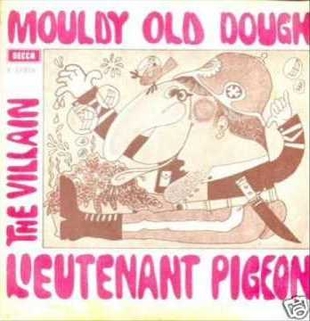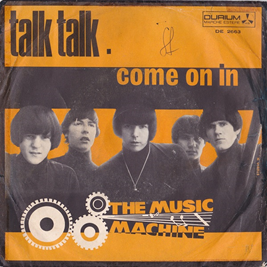
Bananarama are a British-Irish girl group formed in London in 1980. The group, originally a trio, consisted of friends Sara Dallin, Siobhan Fahey, and Keren Woodward. Fahey left the group in 1988 and was replaced by Jacquie O'Sullivan until 1991, when the trio became a duo. Their success on both pop and dance charts saw them listed in the Guinness World Records for achieving the world's highest number of chart entries by an all-female group. Between 1982 and 2009, they had 30 singles reach the Top 50 of the UK Singles Chart.
"Mr. Tambourine Man" is a song written by Bob Dylan, released as the first track of the acoustic side of his March 1965 album Bringing It All Back Home. The song's popularity led to Dylan recording it live many times, and it has been included in multiple compilation albums. It has been translated into other languages and has been used or referenced in television shows, films, and books.

The Beau Brummels was an American rock band. Formed in San Francisco in 1964, the band's original lineup included Sal Valentino, Ron Elliott, Ron Meagher, Declan Mulligan, and John Petersen (drums). They were discovered by local disc jockeys who were looking to sign acts to their new label, Autumn Records, where Sylvester Stewart—later known as Sly Stone—produced the group's early recording sessions. Initially, the band's musical style blended beat music and folk music and typically drew comparisons to the Beatles, while their later work incorporated other music genres such as psychedelic rock and country rock.

"Brown Sugar" is a song recorded by the English rock band the Rolling Stones. Written primarily by Mick Jagger, it is the opening track and lead single from their album Sticky Fingers (1971). It became a number one hit in both the United States and Canada. In the United Kingdom and Ireland, it charted at number two. In the United States, Billboard ranked it as the number 16 song for 1971.

"(Get Your Kicks on) Route 66" is a popular rhythm and blues song, composed in 1946 by American songwriter Bobby Troup. The lyrics relate a westward roadtrip on U.S. Route 66, a highway which traversed the western two-thirds of the U.S. from Chicago, Illinois, to Los Angeles, California. The song became a standard, with several renditions appearing on the record charts.
"Chains" is a rhythm and blues song written by husband-and-wife songwriting team Gerry Goffin and Carole King. It was a hit for the American girl group the Cookies in 1962 and for the English rock band the Beatles, who recorded the song for their debut album in 1963. King recorded a solo version of "Chains" for her 1980 album Pearls: Songs of Goffin and King.

"I Put a Spell on You" is a 1956 song written and composed by Jalacy "Screamin' Jay" Hawkins, whose own recording of it was selected as one of the Rock and Roll Hall of Fame's 500 Songs that Shaped Rock and Roll. It was also included in Robert Christgau's "Basic Record Library" of 1950s and 1960s recordings—published in Christgau's Record Guide: Rock Albums of the Seventies (1981)—and ranked No. 313 on Rolling Stone magazine's list of The 500 Greatest Songs of All Time. The selection became a classic cult song covered by a variety of artists and was his greatest commercial success, reportedly surpassing a million copies in sales, even though it failed to make the Billboard pop or R&B charts.
Lieutenant Pigeon were an English novelty musical group popular in the early 1970s, originating in Coventry.

"No Matter What" is a song originally recorded by Badfinger for their album No Dice in 1970, written and sung by Pete Ham and produced by Mal Evans.

"Mouldy Old Dough" is a primarily instrumental song by Lieutenant Pigeon. It reached the number one spot in 1972 on charts in Belgium, the UK, Ireland and New Zealand.

"Bo Diddley" is a song by American rock and roll pioneer Bo Diddley. It introduced the rhythm that became known as the Bo Diddley beat and topped the Billboard R&B chart for two weeks in 1955. The song is included on many of Diddley's compilation albums including Bo Diddley (1958) and His Best (1997). Buddy Holly recorded a version that became his highest-charting single in the UK.

"Spill the Wine" is the debut single by singer Eric Burdon and the band War, released in May 1970. It was backed by the non-album track "Magic Mountain", and was War's first Billboard chart hit.

Velvet Tinmine is a compilation album consisting of 20 obscure, yet high quality, British pop rock tracks from the glam rock era. Composed of forgotten album tracks and almost hit singles, most of these songs have not been released outside of the UK prior to this 2003 compilation.
"Good Time Music" is a song originally recorded by the American folk-rock band the Lovin' Spoonful in 1965. Written by John Sebastian, it appeared on the 1966 Elektra Records compilation What's Shakin'. Author Richie Unterberger characterizes the song as "a sort of manifesto of the group's optimism in its jaunty rhythms and celebration of the return of good time music to the radio."
Not to be confused with Styx (band)

"Lincoln County" is a 1968 song by British musician Dave Davies, who is best known as a guitarist for the rock band the Kinks. It was his third single.

"Talk Talk" is the debut single of American garage rock band the Music Machine. It was released in November 1966, and produced the band's only Top 20 hit on the Billboard Hot 100. The song was included on their debut album, (Turn On) The Music Machine.

The Genesis of Slade is a compilation album of pre-Slade era recordings by British rock band Slade. It was first released in 1996 by The Music Corporation and was later re-issued by Cherry Red in 2000.

"Gotta Lot of Rhythm in My Soul" is a song first recorded by American country singer Patsy Cline. It was composed by W.S. Stevenson and Barbara Vaughan. It was released as a single in 1959 via Decca Records and was produced by Owen Bradley. It was among a handful of singles released on the Decca label that were unsuccessful for Cline following a major hit in 1957.

"The One for You" is a song written by Swedish guitarist Danne Larsson and recorded by his group Tages in 1965. Following an intensive tour of the Sweden, while also previously having composed songs for the band, Larsson wrote the song inspired by their trip to London, allegedly about a girl he had met there. It was the first recording by Tages produced by Anders Henriksson, who would come to produce the majority of their coming output, along with being their first single recorded at Europafilm Studios in Bromma, Stockholm.


















